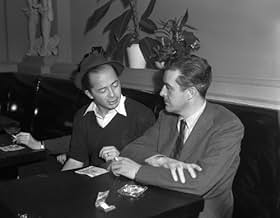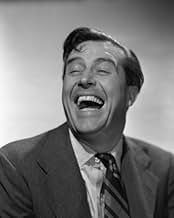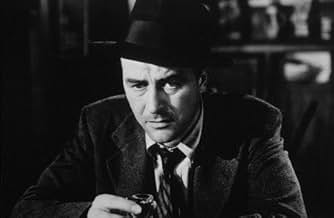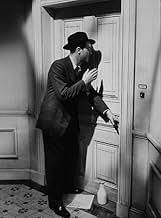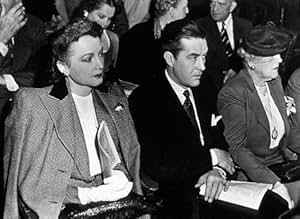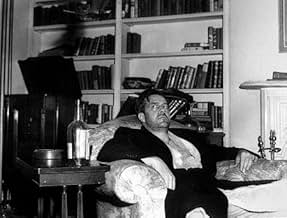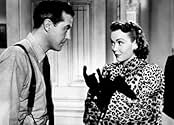IMDb RATING
7.9/10
42K
YOUR RATING
The desperate life of a chronic alcoholic is followed through a four-day drinking bout.The desperate life of a chronic alcoholic is followed through a four-day drinking bout.The desperate life of a chronic alcoholic is followed through a four-day drinking bout.
- Director
- Writers
- Stars
- Won 4 Oscars
- 18 wins & 3 nominations total
Anita Sharp-Bolster
- Mrs. Foley
- (as Anita Bolster)
Andy Andrews
- Alcoholic
- (uncredited)
Gene Ashley
- Male Nurse
- (uncredited)
Walter Baldwin
- Man from Albany
- (uncredited)
Harry Barris
- Pianist at Harry & Joe's
- (uncredited)
Ian Begg
- Undetermined Secondary Role
- (uncredited)
Eddie Borden
- Drunk in Alcoholic Ward
- (uncredited)
Jess Lee Brooks
- Hospital Patient
- (uncredited)
- Director
- Writers
- All cast & crew
- Production, box office & more at IMDbPro
Summary
Reviewers say 'The Lost Weekend' is a groundbreaking film with a realistic portrayal of alcoholism. Ray Milland's performance as Don Birnam is praised for its depth. Billy Wilder's direction and the film's visual style, including deep focus and Miklós Rózsa's haunting score, effectively convey addiction's despair. However, some find it melodramatic and repetitive, with an unrealistic ending. Despite criticisms, it is regarded as powerful and influential in cinema.
Featured reviews
The often stated belief that alcoholism is a mere bodily addiction does not do the truth any justice. Alcoholism is more. It's a state of mind. It's addictive escapism for those who feel cheated by life, a way of avoiding fears and unhappiness, an illusionary method to make up for ones failures. Maybe that's why most therapies do not succeed. They solely concentrate on the illness, rather than on the cause of it. Of course, in many cases the cause cannot be helped...
In The Lost Weekend we accompany the failed writer Don Birnam (Ray Milland) surrendering to the self-destructive nature of his addiction. Despite being good-looking and intelligent, Don is a hopeless alcoholic filled with self-loathing ("The reason is me. What I am. Or rather what I am not.") The brand doesn't matter, the cheaper the better to him it's all the same. Drinking seems to be his only way to escape from his misery and low self-esteem. "Suddenly I'm above the ordinary. I'm competent. I'm walking a tightrope over Niagara Falls. I'm one of the great ones. I'm Michaelangelo, molding the beard of Moses. I'm Van Gogh painting pure sunlight. [...]" That's what a drunk Don tells his favourite barkeeper Nat (Howard Da Silva).
Yet, in one aspect he is lucky. Unlike many of his fellow sufferers he is not alone. After years of abuse, his faithful girlfriend Helen (Jane Wyman) and his brother Wick (Phillip Terry) have still not deserted him. Compassionately they do their utmost to protect Don from himself by keeping him under close observation. With great effort they determined the most inventive hiding-places of his bottles and they even visited nearby liquor stores and bars, begging not to accept Don as a customer. There is nothing they haven't tried, but Don appears to be beyond salvation ("I am not a drinker. I'm a drunk." he tells them.). Just before the three of them are about to go on a weekend trip, Don devises a cunning plan to temporarily get rid of the two persons who care about him, giving him time to acquire the liquid he treasures the most. Soon he is stone drunk, staggering through the streets, always on the lookout for the next drink. For Don there will be no weekend trip. Only the bottle and the desperate humiliations connected with attaining it.
The Lost Weekend is a a drama of great emotional vehemence, lacking the light heartedness of Billy Wilder's later works. It gives unclouded insight into the darkest corners of alcoholism and depicts the powerlessness of the alcoholic over himself. Wilder created great controversy at that time by letting the lead actor succumb to his addiction. He didn't shy away from showing the addict's humiliations when begging for money or booze. Neither did he hesitate to point out the addict's loss of all self-respect when stealing and lying to pay for his one need. The horrifying hallucination scene only adds up to the disturbing decline of Don Birnam's humanity, proving that the greatest horrors lie within our imagination.
This is an excellent film of lasting relevance. It is technically brilliant and shines with great dialogue (which is typical for Wilder). Its storytelling (flashbacks) is superior. Furthermore Ray Millard (Dial M for Murder) gives a terrific and equally courageous performance as the the self-destructive alcoholic. You can see the desperate self-loathing and calculating slyness of a true addict written on his face.
In the end it comes down to two choices. Don can give in to alcoholism and thereby give up on life. Or he can try to overcome his addiction and face his fears and discontentment. Although sheer will-power may not be enough to achieve the latter, it is essential for succeeding. And the cause isn't lost, for there is Helen to help and care for him. Don is not alone. May someone have mercy on those who are...
In The Lost Weekend we accompany the failed writer Don Birnam (Ray Milland) surrendering to the self-destructive nature of his addiction. Despite being good-looking and intelligent, Don is a hopeless alcoholic filled with self-loathing ("The reason is me. What I am. Or rather what I am not.") The brand doesn't matter, the cheaper the better to him it's all the same. Drinking seems to be his only way to escape from his misery and low self-esteem. "Suddenly I'm above the ordinary. I'm competent. I'm walking a tightrope over Niagara Falls. I'm one of the great ones. I'm Michaelangelo, molding the beard of Moses. I'm Van Gogh painting pure sunlight. [...]" That's what a drunk Don tells his favourite barkeeper Nat (Howard Da Silva).
Yet, in one aspect he is lucky. Unlike many of his fellow sufferers he is not alone. After years of abuse, his faithful girlfriend Helen (Jane Wyman) and his brother Wick (Phillip Terry) have still not deserted him. Compassionately they do their utmost to protect Don from himself by keeping him under close observation. With great effort they determined the most inventive hiding-places of his bottles and they even visited nearby liquor stores and bars, begging not to accept Don as a customer. There is nothing they haven't tried, but Don appears to be beyond salvation ("I am not a drinker. I'm a drunk." he tells them.). Just before the three of them are about to go on a weekend trip, Don devises a cunning plan to temporarily get rid of the two persons who care about him, giving him time to acquire the liquid he treasures the most. Soon he is stone drunk, staggering through the streets, always on the lookout for the next drink. For Don there will be no weekend trip. Only the bottle and the desperate humiliations connected with attaining it.
The Lost Weekend is a a drama of great emotional vehemence, lacking the light heartedness of Billy Wilder's later works. It gives unclouded insight into the darkest corners of alcoholism and depicts the powerlessness of the alcoholic over himself. Wilder created great controversy at that time by letting the lead actor succumb to his addiction. He didn't shy away from showing the addict's humiliations when begging for money or booze. Neither did he hesitate to point out the addict's loss of all self-respect when stealing and lying to pay for his one need. The horrifying hallucination scene only adds up to the disturbing decline of Don Birnam's humanity, proving that the greatest horrors lie within our imagination.
This is an excellent film of lasting relevance. It is technically brilliant and shines with great dialogue (which is typical for Wilder). Its storytelling (flashbacks) is superior. Furthermore Ray Millard (Dial M for Murder) gives a terrific and equally courageous performance as the the self-destructive alcoholic. You can see the desperate self-loathing and calculating slyness of a true addict written on his face.
In the end it comes down to two choices. Don can give in to alcoholism and thereby give up on life. Or he can try to overcome his addiction and face his fears and discontentment. Although sheer will-power may not be enough to achieve the latter, it is essential for succeeding. And the cause isn't lost, for there is Helen to help and care for him. Don is not alone. May someone have mercy on those who are...
As a recovering alcoholic (14 years sober) this remains as the first great film dealing with alcoholism. Ray Milland"s great performance shows realistically the insanity of drinking and the struggles. The promises and hidden bottles will ring true to anyone who has dealt with the problem. Billy Wilder's career was noted for his comedies but he showed in "Lost Weekend" that he knew how to deal with serious matter as well. The ending shot is a classic and will be memorable for anyone seeing the film. Check out "Days of Wine & Roses" as well.
The script and score are superb and the acting flawless. Ray Milland is riveting in the role of a man who is as consumed by alcohol as it is consuming him. He lives and breathes for it and all around him become secondary including his long suffering girlfriend.
There is always a girl like this in the life of a good looking useless purposeless alcoholic kept afloat by either a wife or other family member, in this case a brother who pays the bills and tries to sober him up and dry him out periodically.
The score is relentless and highly avant Gard for its time, featuring music normally backing sci-fi flicks. Some of the scenes are profoundly frightening, his stay in the drunk tank with a sadistic feminine male nurse outlining all the horrors that await him and his DTs which feature a bat biting the head off a bird.
Very well done. I felt the ending was a little too pat, that would be my only fault with this.
9 out of 10. Excellent.
There is always a girl like this in the life of a good looking useless purposeless alcoholic kept afloat by either a wife or other family member, in this case a brother who pays the bills and tries to sober him up and dry him out periodically.
The score is relentless and highly avant Gard for its time, featuring music normally backing sci-fi flicks. Some of the scenes are profoundly frightening, his stay in the drunk tank with a sadistic feminine male nurse outlining all the horrors that await him and his DTs which feature a bat biting the head off a bird.
Very well done. I felt the ending was a little too pat, that would be my only fault with this.
9 out of 10. Excellent.
10Don-102
From the first shot of a bottle hanging from a drunk's apartment, we realize we are about to see a clever addict and a weekend of his demented exploits. Ray Milland has an honest face, not unlike Jimmy Stewart's, however, with this character it is only skin-deep. The great thing about his performance and the film as a whole, is that his face will gradually change, becoming dark and chilly, just like Stewart's in IT'S A WONDERFUL LIFE. Stewart had lost his life momentarily. Milland has lost his soul to the bottle and he will stop at nothing to quench his thirst.
This really is a textbook example of the alcoholic's lies and schemes, a precursor to LEAVING LAS VEGAS, although there are people in this film who care about the drinker from the beginning. He just can't stop and we start to lose whatever sympathy we had for him because of how he treats other people. This is a drunk with a sober man wanting to come out, but Wilder's script dives deeply into the unpredictable outcomes of most alcoholics.
LOST WEEKEND was innovative and was almost never released because test audiences could not take the film's realism. The hospital sequence retains its horror, and Milland's withdrawal-induced hallucination of a rat in the wall was like him looking in the mirror. See this movie and you will come away with a completely informed and scary anthology of the antics of a hopeless alcoholic. This is amazing considering it came out of the old Hollywood system.
This really is a textbook example of the alcoholic's lies and schemes, a precursor to LEAVING LAS VEGAS, although there are people in this film who care about the drinker from the beginning. He just can't stop and we start to lose whatever sympathy we had for him because of how he treats other people. This is a drunk with a sober man wanting to come out, but Wilder's script dives deeply into the unpredictable outcomes of most alcoholics.
LOST WEEKEND was innovative and was almost never released because test audiences could not take the film's realism. The hospital sequence retains its horror, and Milland's withdrawal-induced hallucination of a rat in the wall was like him looking in the mirror. See this movie and you will come away with a completely informed and scary anthology of the antics of a hopeless alcoholic. This is amazing considering it came out of the old Hollywood system.
... and not get tired of it. Ray Milland's performance is riveting and, if you are watching for the first time, the first scene will do nothing but raise questions, getting you involved. How did Don (Ray Milland) get to be such an alcoholic? Why does his brother have a right to say how he lives? What does he do for a living? Why does such a seemingly together woman like Helen (Jane Wyman) stay with this guy for three years? All of these questions get answered slowly as the movie unravels over one long weekend that Don was supposed to spend in the country with his brother, but instead spends alone, but thanks to ten dollars that Don's brother left behind, he does not spend it completely alone - he's got money to buy booze.
And yet Don doesn't plan ahead. He thinks enough to cover up the two bottles he buys at the liquor store with some apples that he buys to put up on top of the bag as he walks home so neighbors cannot see the booze, but the urgency doesn't come until he is completely out of liquor and out of the ten bucks to get more. And he is willing to do ANYTHING to get that liquor - he'll pretend to be interested in a girl in a local bar who is obviously crazy about him in order to get a few bucks, he tries to trade his typewriter (he's a failed writer) to a local bar owner for a drink, he steals money from a woman's purse in a nightclub to get booze, he even stages a faux hold-up (he has no gun) to get a bottle from a liquor store.
And that's it for the entire movie - Don Birnham and his quest for the next bottle eats all of his time and energy. Other characters are just instruments in that quest or are in the form of flashbacks to tell you how Don got to where he was in the first scene. And then there's that haunting score that runs the length of the film. Everything is brutal realism UNTIL the last scene. Maybe it was the censors, but today it could have cost the film some Oscars.
A couple of questions never raised. How did Don's brother Wick manage to support himself AND Don all of these years IN New York City? Didn't Wick ever long for a life and family of his own? There's got to be a limit to anybody's patience and charity, even if they are kin. Another question from an old film buff like me - Isn't it odd how the Great Depression and World War II magically disappear from sight in the past that Don is recollecting. 15 years of American history that effected everybody seems to have no place in Don's story. To look at this film, this shiny bustling post-war world has always been there. This is the turn of film from Depression and world war - collective struggles - back to the struggle of the individual with himself, the beginning of noir.
And yet Don doesn't plan ahead. He thinks enough to cover up the two bottles he buys at the liquor store with some apples that he buys to put up on top of the bag as he walks home so neighbors cannot see the booze, but the urgency doesn't come until he is completely out of liquor and out of the ten bucks to get more. And he is willing to do ANYTHING to get that liquor - he'll pretend to be interested in a girl in a local bar who is obviously crazy about him in order to get a few bucks, he tries to trade his typewriter (he's a failed writer) to a local bar owner for a drink, he steals money from a woman's purse in a nightclub to get booze, he even stages a faux hold-up (he has no gun) to get a bottle from a liquor store.
And that's it for the entire movie - Don Birnham and his quest for the next bottle eats all of his time and energy. Other characters are just instruments in that quest or are in the form of flashbacks to tell you how Don got to where he was in the first scene. And then there's that haunting score that runs the length of the film. Everything is brutal realism UNTIL the last scene. Maybe it was the censors, but today it could have cost the film some Oscars.
A couple of questions never raised. How did Don's brother Wick manage to support himself AND Don all of these years IN New York City? Didn't Wick ever long for a life and family of his own? There's got to be a limit to anybody's patience and charity, even if they are kin. Another question from an old film buff like me - Isn't it odd how the Great Depression and World War II magically disappear from sight in the past that Don is recollecting. 15 years of American history that effected everybody seems to have no place in Don's story. To look at this film, this shiny bustling post-war world has always been there. This is the turn of film from Depression and world war - collective struggles - back to the struggle of the individual with himself, the beginning of noir.
Oscars Best Picture Winners, Ranked
Oscars Best Picture Winners, Ranked
See the complete list of Oscars Best Picture winners, ranked by IMDb ratings.
Did you know
- TriviaBilly Wilder claimed the liquor industry offered Paramount Pictures $5 million not to release the film; he also suggested that he would have accepted had they offered it to him personally.
- GoofsWhen the waiter gives Don the check at Harry & Joe's and he reaches for it, the glass, ashtray, napkin, and cigarette all change position between camera shots.
- Quotes
[Nat moves to wipe away the circle of whisky from Don Birnam's glass]
Don Birnam: Don't wipe it away, Nat. Let me have my little vicious circle. You know, the circle is the perfect geometric figure. No end, no beginning.
- ConnectionsEdited into Les cadavres ne portent pas de costard (1982)
- SoundtracksLa Traviata
(1853) (uncredited)
Music by Giuseppe Verdi
Libretto by Francesco Maria Piave
Libiamo ne' lieti calici (Drinking Song) Performed by John Garris and Theodora Lynch with The San Francisco Opera Company
Details
Box office
- Budget
- $1,250,000 (estimated)
- Gross worldwide
- $813
- Runtime1 hour 41 minutes
- Color
- Aspect ratio
- 1.37 : 1
Contribute to this page
Suggest an edit or add missing content


